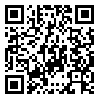Volume 6, Issue 2 (Autumn&Winter 2020)
KJES 2020, 6(2): 255-264 |
Back to browse issues page
Download citation:
BibTeX | RIS | EndNote | Medlars | ProCite | Reference Manager | RefWorks
Send citation to:



BibTeX | RIS | EndNote | Medlars | ProCite | Reference Manager | RefWorks
Send citation to:
Goshtasbi K, nikkah M, ahangari K. Calculation of Felicity ratio for phyllites specimens with different angles of anisotropy under uniaxial loading. KJES 2020; 6 (2) :255-264
URL: http://gnf.khu.ac.ir/article-1-2756-en.html
URL: http://gnf.khu.ac.ir/article-1-2756-en.html
1- , goshtasb@modares.ac.ir
Abstract: (2019 Views)
The utilize of Kaiser effect during acoustic emission testing is a novel approach for computing the amount of stress in the rock, which has been tremendously exploited due to the immense reduction in the cost and time of determining the in-situ stress. The Felicity ratio is a precise and appropriate criterion for assessing the accuracy in the evaluation of the Kaiser effect. Numerous factors influence the accuracy of the Kaiser effect. This paper investigates the effect of anisotropy on the Kaiser effect on the rock. For this purpose, acoustic emission effect in the unconfined compression test on the Phyllites specimens with various angles of anisotropy (0, 30, 60, and 90°) has been conducted. The results demonstrate that in all unconfined compression tests, the Felicity ratio of acoustic emission is close to one. In other words, the anisotropy does not have a significant effect on the values of the Felicity ratio. In addition, the results show that the unconfined compression tests are more accurate in determining the Kaiser effect.
Subject:
Engineering Geology
Received: 2020/06/27 | Accepted: 2021/02/20 | Published: 2021/02/28
Received: 2020/06/27 | Accepted: 2021/02/20 | Published: 2021/02/28
Send email to the article author
| Rights and permissions | |
 |
This work is licensed under a Creative Commons Attribution-NonCommercial 4.0 International License. |






